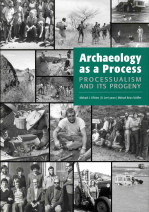 【書名】Archaeology as a Process: Processualism and Its Progeny
【書名】Archaeology as a Process: Processualism and Its Progeny【著者】Michael J. O'Brien, R. Lee Lyman, and Michael Brian Schiffer
【URL 】http://www.uofupress.com/store/product258.html
【刊行】2005年
【出版】The University of Utah Press, Salt Lake City
【頁数】x+350 pp.
【定価】US$ 49.50 (hardcover)
【ISBN】0-87480-817-0
【紹介】
1960年代に始まり現在にいたる40年間に及ぶ,アメリカ考古学界の流れを考古学の理論と方法をめぐる論争を軸に描くことがこの本の目指すところだそうだ(p. ix).もちろん,本書のタイトルのもととなった David Hull の本については,評価はきわめて高い:
He [Hull] makes a convincing argument that one cannot hope to understand the history of a science without understanding the people involved. To that end he interweaves theories with personalities, methods with alliances, and results with jealousies. […] [I]f you want to know how science really works — read Hull's Science as a Process. As someone with a long professional involvement with systematics, Hull has an inside view of the social and conceptual development of the discipline, which he uses to full advantage. (p. 1)
ぼくが最初にこの本を読んだときに受けた印象とほぼ同じだ.
本書は考古学の現代史(それもアメリカの)なので,ぼくには畑違いであることは確かだ.それでも,基本方針がはっきりしているので,全体として心安らかに読めると思う.
【目次】
Preface ixIntroduction 1
1. The "Old" Archaeology 8
Measuring Time with Units of Depositions 15
The Artifact Classification Problem 17
Continuing Struggles 18
The Evolution of Culture (and of Cultures) 20
The Seeds of Discontent 27
On the Eve of Processual Archaeology 32
2. A New Perspective in Arch(a)eology 36
The Architect of Processual Archaeology 39
Motives and Red Herrings 51
Binford on Culture and Culture Process 60
Changing Views of Architects 62
3. The First Processualist Case Studies 67
Ceramic Sociology 68
The Study of Systems 75
Cultural Ecology 79
The Study of Settlement 83
4. Making Archaeology Explicitly Scientific 92
Reacting and Taking Stock 93
History or Science? 97
Law and Order versus Systems Theory 101
Processualism and the Philosophy of Science 104
A Textbook for Science in Arch(a)eology 111
5. Science or History? 121
The Use of Analogy 128
Experimental Archaeology 130
Early Ethnoarchaeology 133
Uniformitarianism and Human Behavior 135
Statistics and Archaeology 139
Classification and Pattern Recognition 143
Probability Sampling 147
6. Fortunes to Be Made (and Lost) 153
Managing the Nation's Archaeological Resources 157
The Moss-Bennett Bill 161
What Does "Significant" Mean? 163
Academic Archaeology versus Contract Archaeology 166
The Impact of CRM on the Profession 171
The Impact of VRM on Method and Theory 175
7. Home on the Middle Range 178
The Competitive Marketplace of Processual Archaeology 180
Michigan Evolutionism 194
Analogical Issues 205
Ethnoarchaeology and Ethnographic Analogy 206
Middle-Range Theory 209
Behavioral Archaeology, Formation-Process Theory, and the POMPEII Premise 210
Four Strategies: The Birth of Behavioral Archaeology 211
Disorganization and Destruction of the Archaeological Record 212
8. Fall from Grace 219
Symbolic, Structural, and Contextual Archaeology 231
Critical Archaeology, Social Dominance and Power, and Gender 234
Reactions to Postprocessual Archaeology 237
Darwinian Archaeology 239
Reactions to Darwinian Archaeology 244
Behavioral Archaeology 246
The Modern Language 248
9. Tribal Encounters 253
Blind Ambition or Advancing the Discipline? 254
Selection and Intellectual Fitness 256
Artistic Movements 261
Tribal Units 262
Notes 269
References 271
Index 341